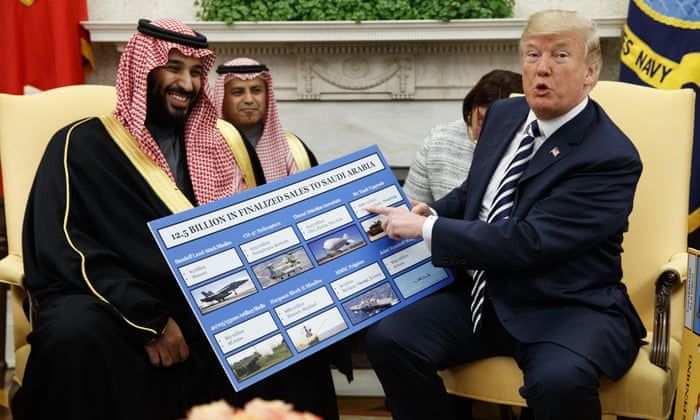3 February 2021
The poor human rights records of Washington’s Gulf allies pose a difficult balancing act between morality and realpolitik.
The Biden administration have paused arms sales to Saudi Arabia and the United Arab Emirates to complete what Secretary of State Anthony Blinken is calling a ‘typical’ review process. Washington’s Gulf allies are now waiting to see whether the arms sales they negotiated during President Trump’s time in the White House will still be going ahead.
^ President Trump and Saudi Crown Prince Mohammed bin Salman during a meeting in the Oval Office. Source: Evan Vucci/AP
Several multi-million-dollar deals are now at stake. Most notably is an agreement for the UAE to purchase 50 F-35 multirole combat aircraft and 18 MQ-9 Reaper drones. The arms deal was reportedly signed a mere hour before President Joe Biden was sworn into office. Also at risk is a $478 million deal for Saudi Arabia to acquire approximately 7,500 laser-guided smart bombs from US firm Raytheon Technologies.
The Biden administration’s decision to pause arms sales does not come as a surprise. Biden has been a vocal critic of the Saudi-led war effort in Yemen since at least 2019, during the early stages of his presidential campaign. More broadly, a feeling of unease has been increasing amongst US policymakers from both parties as the list of allegations against Washington’s allies in the Gulf continues to grow.
The arms industry also appears to have been bracing for a reversal. Last week, executives from Raytheon informed investors that they were expecting the new administration to halt one or more of their arms deals with a partner in the Middle East.
A Strategic Shift in the Middle East?
A broader question raised by the weapons sale freeze is whether it foreshadows a reset in relations between the US and its allies in the Gulf. Biden’s rhetoric certainly implies this. In 2019 he said: ‘I would end US support for the disastrous Saudi-led war in Yemen and order a reassessment of our relationship with Saudi Arabia.’ Having won the presidency, Biden now has the authority to reroute the direction the US takes with its allies in the Gulf.
Saudi Arabia launched the military intervention in Yemen in March 2015, at the head of a coalition of nine countries which also includes the UAE. The Saudi-led coalition has provided support for Yemeni President Abdrabbuh Mansur Hadi against the Houthi movement which ousted him from the capital, Sanaa. Saudi Arabia has grown particularly concerned with the increasing degree of Iranian support for the Houthis and in many ways the Yemeni Civil War has become an extension of the protracted cold war between Iran and Saudi Arabia.
Saudi Arabia and the UAE have both been accused of committing war crimes and humanitarian abuses relating to their involvement in the Yemeni Civil War. The US has also been implicated in these accusations. For instance, when Human Rights Watch accused Saudi Arabia of dropping cluster munitions in May 2015, the weapons in question were alleged to be American-made CBU-105 Sensor Fuzed Weapons. Over 100 countries have agreed to prohibit the use of such weapons as mandated by the Convention on Cluster Munitions (CCM), but neither the US nor Saudi Arabia are party to this treaty.
The assassination of journalist Jamal Khashoggi by Saudi assassins in October 2018 made it even harder for the US to ignore its ally’s blatant disregard for human rights. Khashoggi is believed to have been targeted because of his open criticism of the Saudi government. However, Trump dismissed allegations that the Saudi government was behind the assassination, despite widespread condemnation in Washington.
With Biden in office, the White House is far more likely to risk alienating Saudi Arabia and the UAE to distance the US from a growing list of alleged human rights abuses. Biden may even find increasingly elusive bipartisan support to do this. Trump was criticised by Republicans and Democrats for his treatment of the Khashoggi assassination and in April 2019, the House of Representatives passed a resolution to withdraw American support for the war in Yemen. This was vetoed by Trump, but there are members of both parties who are keen to revaluate the US’s relationship with its Gulf partners.
However, the Biden administration will have a tough time balancing efforts to distance the US from accusations of complicity with the need to take a multilateral approach in the Middle East and cooperate closely with allies.
In its relationship with Saudi Arabia in particular, the US has always struggled to reconcile American moral norms with the cold hard rationale of realpolitik. Saudi Arabia’s Islamic theocracy is completely antithetical to American norms and values, but still, Riyadh has aided Washington in securing its energy interests and acted as a counterweight to Tehran and Islamist extremism, despite a certain tendency for the Saudis to export that same extremism abroad.
Policy makers in Washington are faced with a difficult choice between moral clarity and realpolitik. If the US alienates partners like Saudi Arabia and the UAE due to its moral misgivings, the US may find itself bereft of allies in the Middle East. Conversely, if the US gives in solely to the demands of political realism, Washington risks undermining the norms and values which underpin the American-led order, which could pose adverse consequences over the long term.
The previous administration opted for the realpolitik approach. Trump leveraged the lure of American-made weapons to secure diplomatic gains in the Middle East. The F-35 sale to the UAE was agreed on the condition that the Emiratis formalise relations with Israel as part of a broader strategic effort to realign relations in the region. The Gulf states have long resisted recognising Israel out of fears for losing domestic support, but the perceived threat of an increasingly dangerous Iran has begun to change this. Washington can afford to divert resources from the Middle East if its allies present a more cohesive front against threats in the region like terrorism or a more belligerent Iran.
A possible scenario is that the Biden administration will allow the arms sales to continue, on the condition that Saudi Arabia and the UAE make certain human rights assurances. Alternatively, Washington may withdraw licences for the weapons purchases altogether, but offer Gulf allies certain assurances elsewhere, such as an American commitment to protect their interests from Iranian encroachments. The latter will likely prove important either way, since the Biden administration plans to re-join the Iran nuclear deal, which was never well received by Saudi Arabia and the UAE in the first place.
A deliberate policy of estrangement by the US towards its Gulf allies is unlikely despite the rhetoric of the Biden administration and cross-party condemnation of human rights abuses in the region. US influence in the Greater Middle East is diminished. Other actors like Russia and Turkey have exploited the strategic space abandoned by policy makers in Washington who are increasingly keen on American withdrawal. The Middle East is still a vital theatre for American interests, but the US is also anxious to divert attention and resources towards the rise of China. For the US to do this, it must be able to rely on several allies in the region and that will certainly entail continued cooperation with Saudi Arabia and the UAE, however odious their human rights record may be.












